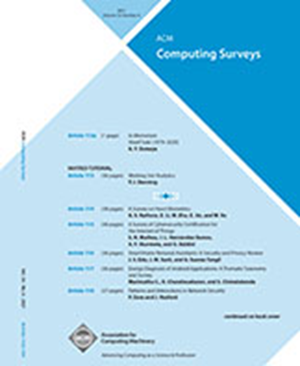A Survey on the Shared Address Space with Privatized Static Variables (SAS-PSV) Execution Model for Many-Core Era
IF 28
1区 计算机科学
Q1 COMPUTER SCIENCE, THEORY & METHODS
引用次数: 0
Abstract
Parallel applications often use MPI processes and OpenMP threads. Those parallel execution models, multi-process and multi-thread, were invented to increase efficiency on uniprocessor systems. In the multi-process approach, each process’s isolated address space may make communication expensive; in the multi-thread design, shared variables may cause access conflicts and stall executions. Processes or threads interact and exchange information more often as CPU cores increase, and traditional execution models may create bottlenecks. The paradigm shift from uniprocessor to many-core systems necessitates the development of new parallel execution models to address challenges posed by the two parallel models. When processes share an address space, what happens? If threads don’t share static variables? Sharing an address space and privatizing static variables reduces information exchange and shared static variable exclusion costs. This survey investigates多核时代私有静态变量共享地址空间(SAS-PSV)执行模型研究
并行应用程序通常使用MPI进程和OpenMP线程。这些并行执行模型,多进程和多线程,是为了提高单处理器系统的效率而发明的。在多进程方法中,每个进程的隔离地址空间可能会增加通信开销;在多线程设计中,共享变量可能导致访问冲突和执行暂停。随着CPU核数的增加,进程或线程之间的交互和信息交换会更加频繁,而传统的执行模型可能会产生瓶颈。从单处理器到多核系统的范式转变需要开发新的并行执行模型来解决这两种并行模型带来的挑战。当进程共享一个地址空间时,会发生什么?如果线程不共享静态变量?共享地址空间和私有静态变量减少了信息交换和共享静态变量排除成本。本调查研究了带有私有静态变量的共享地址空间(SAS-PSV),这是一种新的执行架构,允许共享地址空间和静态变量私有化。这个概念由MPC、SMARTMAP、PVAS、PiP和AMPI实现。每个都有不同的方法和执行。本文分析了这些实现的概念、细节和隐藏的缺陷。我们还介绍了SAS-PSV的应用和需要解决的问题。
本文章由计算机程序翻译,如有差异,请以英文原文为准。
求助全文
约1分钟内获得全文
求助全文
来源期刊

ACM Computing Surveys
工程技术-计算机:理论方法
CiteScore
33.20
自引率
0.60%
发文量
372
审稿时长
12 months
期刊介绍:
ACM Computing Surveys is an academic journal that focuses on publishing surveys and tutorials on various areas of computing research and practice. The journal aims to provide comprehensive and easily understandable articles that guide readers through the literature and help them understand topics outside their specialties. In terms of impact, CSUR has a high reputation with a 2022 Impact Factor of 16.6. It is ranked 3rd out of 111 journals in the field of Computer Science Theory & Methods.
ACM Computing Surveys is indexed and abstracted in various services, including AI2 Semantic Scholar, Baidu, Clarivate/ISI: JCR, CNKI, DeepDyve, DTU, EBSCO: EDS/HOST, and IET Inspec, among others.
 求助内容:
求助内容: 应助结果提醒方式:
应助结果提醒方式:


